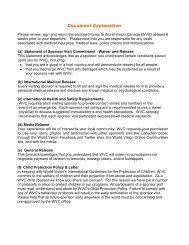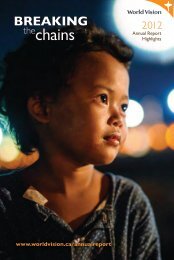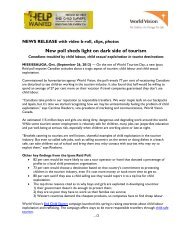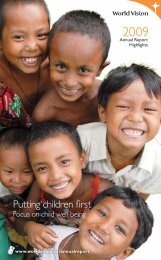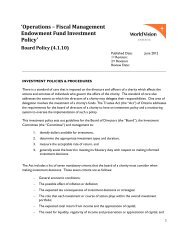Four Stories - World Vision Canada Church Engagement
Four Stories - World Vision Canada Church Engagement
Four Stories - World Vision Canada Church Engagement
Create successful ePaper yourself
Turn your PDF publications into a flip-book with our unique Google optimized e-Paper software.
Abolition 2013 – <strong>Four</strong> <strong>Stories</strong><br />
Yong – A Trafficking Story<br />
Laos<br />
In Yong’s village of about 400<br />
families, survival usually means<br />
finding work elsewhere. There are<br />
few opportunities close to home to<br />
earn an income that would support<br />
even basic needs. Many parents<br />
cannot afford to send their children<br />
to school and the boys and girls<br />
spend a lot of time in the village<br />
unsupervised.<br />
All Yong wanted was to help his<br />
parents. Yong took a huge personal<br />
risk and travelled to Thailand. He<br />
first worked in an aluminum<br />
company where he was paid 3,000<br />
Yong feels fortunate to be alive back in his village in Laos<br />
baht (about $90) per month. The<br />
work was intense and backbreaking. Yong could not keep up. When he told the company that he<br />
wanted to return to Laos, they informed he needed to earn his fare by working for it.<br />
Yong and Hou, another worker, were taken by bus to Malaysia. They were forced to work in a plantation<br />
spraying pesticides. There was no protective clothing. Yong and Hou developed skin allergies from the<br />
chemicals. Worried about their health, they begged the owner to let them go home. He refused and<br />
confiscated their passports.<br />
Yong and his friend escaped and walked for three days without food. They had no other choice. The pair<br />
survived on only the water that they brought with them. They were apprehended by the police and<br />
eventually Yong was able to contact his parents and inform them of his situation. He returned home,<br />
happy just to be alive.<br />
Many young people from the villages become unwilling victims of trafficking. They don’t realize the risks<br />
of being caught in an abusive situation from which they can’t escape.<br />
<strong>World</strong> <strong>Vision</strong>’s Anti-Trafficking Program in Laos has intensified its campaign to promote awareness<br />
about trafficking. Staff members engage with people who are vulnerable to trafficking, including<br />
children, youth, minority groups and those living in villages close to trafficking hot spots. This work is<br />
vital to prevent people from being exploited as Yong was, and to provide support for the survivors of<br />
trafficking.<br />
Page 1 of 4
Abolition 2013 – <strong>Four</strong> <strong>Stories</strong><br />
Two <strong>Stories</strong> from Latin America<br />
Sonite Edmond, Haiti<br />
Sonite Edmond, age 14, is now in her third year of<br />
secondary education at Tamarin National School,<br />
on the island of La Gonave, Haiti. But just a few<br />
years ago, the possibility of studying was only a<br />
distant dream.<br />
Sonite worked as a “restavek,” or domestic<br />
labourer, in a relative's home in Port-au-Prince.<br />
Sonite’s family was in the situation that many<br />
Haitians find themselves. Unable to afford school<br />
fees or the cost of uniforms and books, they send<br />
Children at the L'Ecole National de Tamarin, in Haiti, built<br />
with the help of <strong>World</strong> <strong>Vision</strong> supporters<br />
their children to the city to work. What seems like the only solution in a difficult situation soon becomes<br />
an entrenched pattern. Children work long hours in domestic work and are treated as second-class<br />
citizens. They miss out on schooling and have little hope of escaping their difficult lives.<br />
<strong>World</strong> <strong>Vision</strong>'s sponsorship program became Sonite’s bridge to hope. Now, Sonite and her brother<br />
attend Tamarin School. “It's not fair that some kids get to go to school and others don't,” says Sonite.<br />
“As long as I'm alive I'd like to keep going to school. I want to keep learning, because without this you're<br />
nothing." For Sonite, there is no turning back.<br />
Mayra and her boys, Ecuador<br />
In a cocoa-producing area of rural Ecuador, Mayra was concerned that their family income would not be<br />
enough to keep her children in school. “I always wanted my children to study because if you don’t study,<br />
you are nobody,” says Mayra. But her husband’s seasonal work only brought in $50-$60 a week during<br />
good times—and nothing at all for up to three months in winter.<br />
Mayra and other women in her community looked for ways to<br />
change their situation. Together, they joined a <strong>World</strong> <strong>Vision</strong><br />
project promoting fair-trade goods.<br />
The 20 women learned how to make cocoa cakes, cocoa<br />
powder, chocolates and candies. They learned business skills<br />
and how to market their products. A few months later the<br />
women opened their fair trade business, contributing part of<br />
the set-up investment themselves. "It seemed impossible to<br />
gather the money but we saved our earnings,” recalls Mayra.<br />
<strong>World</strong> <strong>Vision</strong> contributed equipment and materials to support<br />
the women, and helped get their products to markets in Quito,<br />
the capital city. Two years after the business started up, Mayra<br />
earns around $30-$40 a month. She uses the money to keep<br />
her sons in school. “I’m so proud,” says Mayra, “because<br />
nobody ever thought this could be possible.”<br />
A community-run fair trade cocoa business helps<br />
keep Mayra's sons in school<br />
Page 2 of 4
Abolition 2013 – <strong>Four</strong> <strong>Stories</strong><br />
Alphonsine and Her Children<br />
Democratic Republic of Congo<br />
Every day, Alphonsine Ngolo, 37,<br />
and five of her children go to the<br />
copper mining quarry in<br />
Kambove, [southern Congo] to<br />
work. The area is baked in sun<br />
and constantly dusty. They wear<br />
no protective clothing.<br />
Sometimes they even forego the<br />
relative comfort of hand-medown<br />
sandals to work more<br />
efficiently barefoot.<br />
Alphonsine and her kids dig up<br />
and clean rocks to see if they can<br />
Alphonsine (background) and children spend their days in the copper quarry<br />
get a sellable amount of raw<br />
copper. They have to work through a large quantity of the discarded soil and rock to find the greenish<br />
copper pieces. Then they clean the raw copper for selling. On a good day they might pull together<br />
enough copper ore to earn the equivalent of $3. That money mostly goes to food.<br />
"My husband is sick on the bed two years now and nobody is assisting my family with food and soap.<br />
[That is] why I decided to work in the mining here, children assisting me, as they don't have [anything] to<br />
do at home," Alphonsine says.<br />
The area is responsible for<br />
producing thousands of metric<br />
tonnes of copper a year, but has<br />
no health centre or school.<br />
Alphonsine and her family are<br />
caught in the system. Their only<br />
option is to work in the mine.<br />
One of Alphonsine's daughters sifting for raw copper in the quarry<br />
The <strong>World</strong> <strong>Vision</strong> Congo and<br />
<strong>Canada</strong> offices are currently<br />
working with local government<br />
officials to ensure that<br />
development in the area takes<br />
into account the needs of<br />
families in Alphonsine’s<br />
community and others like it.<br />
Page 3 of 4
Abolition 2013 – <strong>Four</strong> <strong>Stories</strong><br />
Jonaki’s Story<br />
Bangladesh<br />
Eleven-year-old Jonaki lives with her parents<br />
and younger sister in northern Bangladesh. Her<br />
father is a small teashop-keeper. Her mother<br />
works at home. They did not earn enough to<br />
meet the family’s needs and the family often<br />
went to bed hungry. Her parents did not have<br />
enough money for school and Jonaki, at only<br />
nine years old, spent her days in a ‘Bidi’<br />
(pronounced “beedi”) factory where she made<br />
hand-made cigarettes from unrefined tobacco<br />
leaves.<br />
Jonaki and her family preparing a meal at home<br />
Bidi making is dirty, punishing work in dust-filled factories. Workers face serious health risks, like severe<br />
muscle strain and respiratory illnesses. They spend their days working quickly to roll tobacco flakes in<br />
paper or a tobacco leaf, tie off the ends and then use a sharp knife to finish off the crude cigarettes.<br />
They must roll their quota of 1000 bidis each day to take home less than one dollar at the end of a 12<br />
hour shift. For Jonaki, the choice was to roll bidis or go hungry.<br />
“Life was not easy for me. It was hard grinding all day. I have been mistreated and manhandled at times<br />
by my employers. I had to work from dawn to dusk and never had the chance to go to school. I was<br />
totally illiterate,” Jonaki says.<br />
Jonaki joined the Non-formal Primary Education (NFPE) Program in 2010 under the Child Rescue Project.<br />
She now regularly attends classes and is a good student. “Once I joined <strong>World</strong> <strong>Vision</strong>’s NFPE Program, I<br />
never looked back,” Jonaki says. “This was a<br />
once in a lifetime opportunity. I did not want<br />
to lose it at any cost. I grabbed it with both<br />
hands!”<br />
The <strong>World</strong> <strong>Vision</strong> program is also making<br />
deeper changes. “As I participate in various<br />
awareness sessions on child rights and<br />
protection issues and, as well, other factors<br />
related to under-age marriage, trafficking,<br />
abuse etc., I can now firmly justify that<br />
equality is the key to protecting myself and<br />
bringing a better life,” Jonaki says.<br />
Jonaki has embraced education "with both hands!"<br />
Page 4 of 4


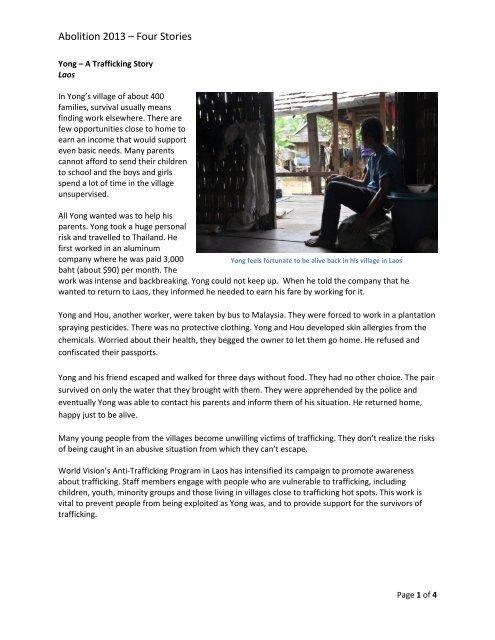
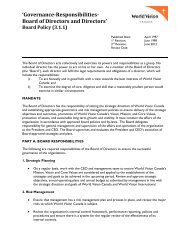
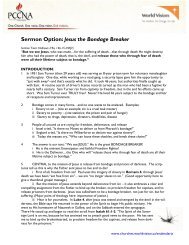

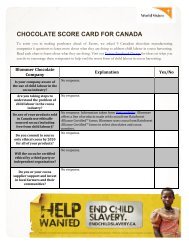
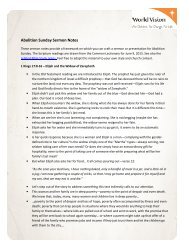

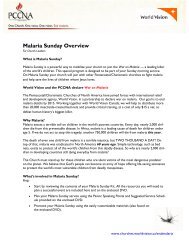
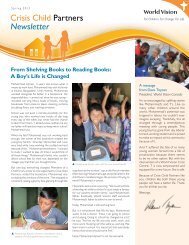
![Download the Red Letters Bible Study guide [PDF] - World Vision ...](https://img.yumpu.com/38523640/1/185x260/download-the-red-letters-bible-study-guide-pdf-world-vision-.jpg?quality=85)
